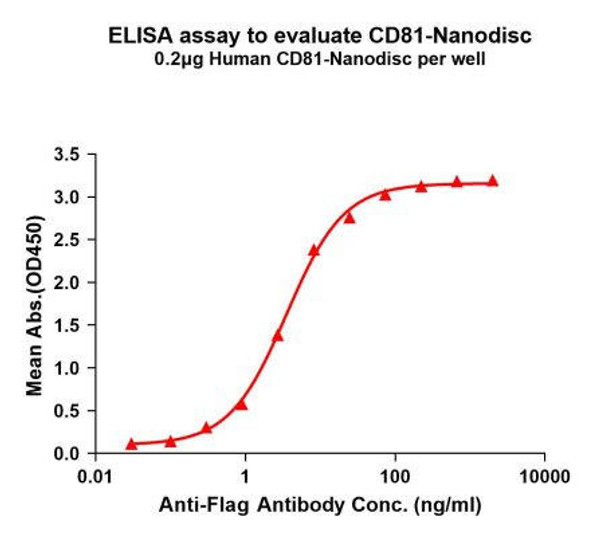Description
system_update_altDatasheet
| Product name | Human CD81 full length protein-synthetic nanodisc |
| Size: | 10ug |
| Product SKU: | HDFP031 |
| Product Category | Full Length Transmembrane Proteins |
| Target: | CD81 |
| Uniprot: | P60033 |
| Description: | Human CD81 full length protein-synthetic nanodisc |
| Molecular Weight: | The human full length CD81 protein has a MW of 25.6 kDa |
| Protein Family: | Druggable Genome, ES Cell Differentiation/IPS, Transmembrane |
| Protein Pathways: | B cell receptor signaling pathway |
| Storage & Shipping: | Store at -20°C to -80°C for 12 months in lyophilized form. After reconstitution, if not intended for use within a month, aliquot and store at -80°C (Avoid repeated freezing and thawing). Lyophilized proteins are shipped at ambient temperature. |
| Synonyms: | CVID6; S5.7; TAPA1; TSPAN28 |
| Expression System: | HEK293 |
| Formulation: | Lyophilized from nanodisc solubilization buffer (20 mM Tris-HCl, 150 mM NaCl, pH 8.0). Normally 5% - 8% trehalose is added as protectants before lyophilization. Please see Certificate of Analysis for specific instructions. |
| Background: | The protein encoded by this gene is a member of the transmembrane 4 superfamily, also known as the tetraspanin family. Most of these members are cell-surface proteins that are characterized by the presence of four hydrophobic domains. The proteins mediate signal transduction events that play a role in the regulation of cell development, activation, growth and motility. This encoded protein is a cell surface glycoprotein that is known to complex with integrins. This protein appears to promote muscle cell fusion and support myotube maintenance. Also it may be involved in signal transduction. This gene is localized in the tumor-suppressor gene region and thus it is a candidate gene for malignancies. Two transcript variants encoding different isoforms have been found for this gene. [provided by RefSeq, Jul 2014] |
| Delivery: | 3-4 weeks |
| Usage | Research use only |












